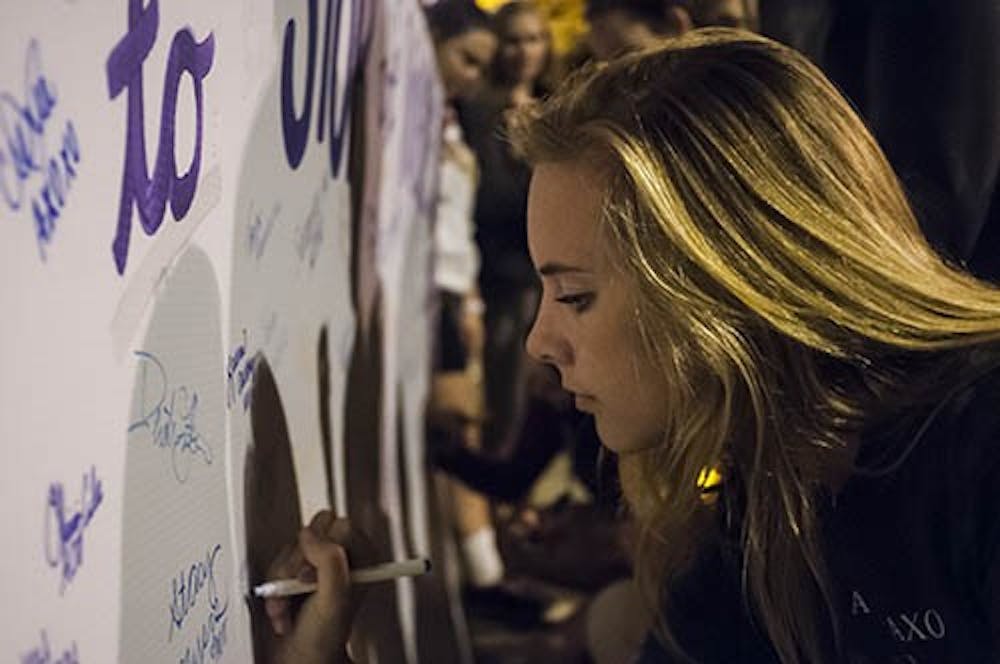Tips from Allison Wynbissinger to stay safe
-Go out with friends and people you know well.
-When it’s time to go home, leave with the people you came with.
-Look out for your friends: don’t leave them at a location by themselves or with people they don’t know well.
-Look out for others, even if they’re not your friends. If you have a bad feeling or something “looks sketchy” then it probably is.
-If you are drinking, know your limits. Alcohol impairs your ability to make judgments.
-Don’t just ‘watch your drink’ but also watch how much someone is giving you to drink. Alcohol is the No. 1 date rape drug. People may be offering it in mass quantities with the intention of getting you really drunk so that they can have sex with you (which is nonconsensual sex, and is considered rape).
Jack Hesser, SGA president and a senior microbiology and botany major, is a strong advocate for educating his peers during what is known as the red zone period.
“As a survivor of sexual assault, I know firsthand what horrible things can happen during the red zone," Hesser said. “It is so important to educate during this time period and make students aware of our campus support resources.”
The start of college and a new school year means parental supervision is at a minimum and students have to adjust to living independently. With these changes, the Red Zone, or the first six weeks of college, is labeled as a high-risk time for students, with an increase in both alcohol consumption and sexual assaults during that time.
In 2010, there were approximately 189,000 emergency room visits by persons under the age of 21 for injuries and other conditions linked to alcohol, according to the Indiana Coalition to Reduce Underage Drinking.
Allison Wynbissinger, Ball State victim advocate, said while alcohol does not cause sexual assaults, alcohol is involved approximately 50 percent of the time, by either the perpetrator, the survivor or both.
She said the Red Zone is extended to a six-week time frame due to freshman students meeting new people and attempting to fit in with the idea that all college students drink excessively. As for upperclassmen, returning to campus and being reunited with friends poses the opportunity for celebration.
The Office of Victims Services tries to educate students during the red zone about drinking responsibly and alternative ways to party on campus without alcohol. The office takes requests from classrooms, residence halls or Greek Life organizations to do their Party Smart tips presentation. Wynbissinger said the most important thing for students is not being the perpetrator of an assault.
“First and foremost, the best advice I can offer to anyone is not be a perpetrator of this crime: Do not sexually assault other people,” Wynbissinger said in an email.
Sexual assault is one of the most under-reported violent crimes, with an estimated 68 percent going unreported, according to the Rape, Abuse and Incest National Network.
SGA will make visits to organizations on campus regarding resources available, such as the Step In. Speak Up. application. A social media campaign aimed to raise awareness of ways to prevent sexual assaults and substance abuse will also be launched.
“Society often places the blame first on the survivor, quickly questioning things like, ‘What were you doing there?’ and, ‘What were you wearing?’ as if it in anyway justifies the actions taken by the assailant," Hesser said. "Sexual assault is not anyone’s fault but the person who committed the assault."
|
Tips from Allison Wynbissinger to stay safe • Go out with friends and people you know well. • When it’s time to go home, leave with the people you came with. • Look out for your friends: don’t leave them at a location by themselves or with people they don’t know well. • Look out for others, even if they’re not your friends. If you have a bad feeling or something “looks sketchy” then it probably is. • If you are drinking, know your limits. Alcohol impairs your ability to make judgments. • Don’t just ‘watch your drink’ but also watch how much someone is giving you to drink. Alcohol is the No. One date rape drug. People may be offering it in mass quantities with the intention of getting you really drunk so that they can have sex with you (which is nonconsensual sex, and is considered rape). |





